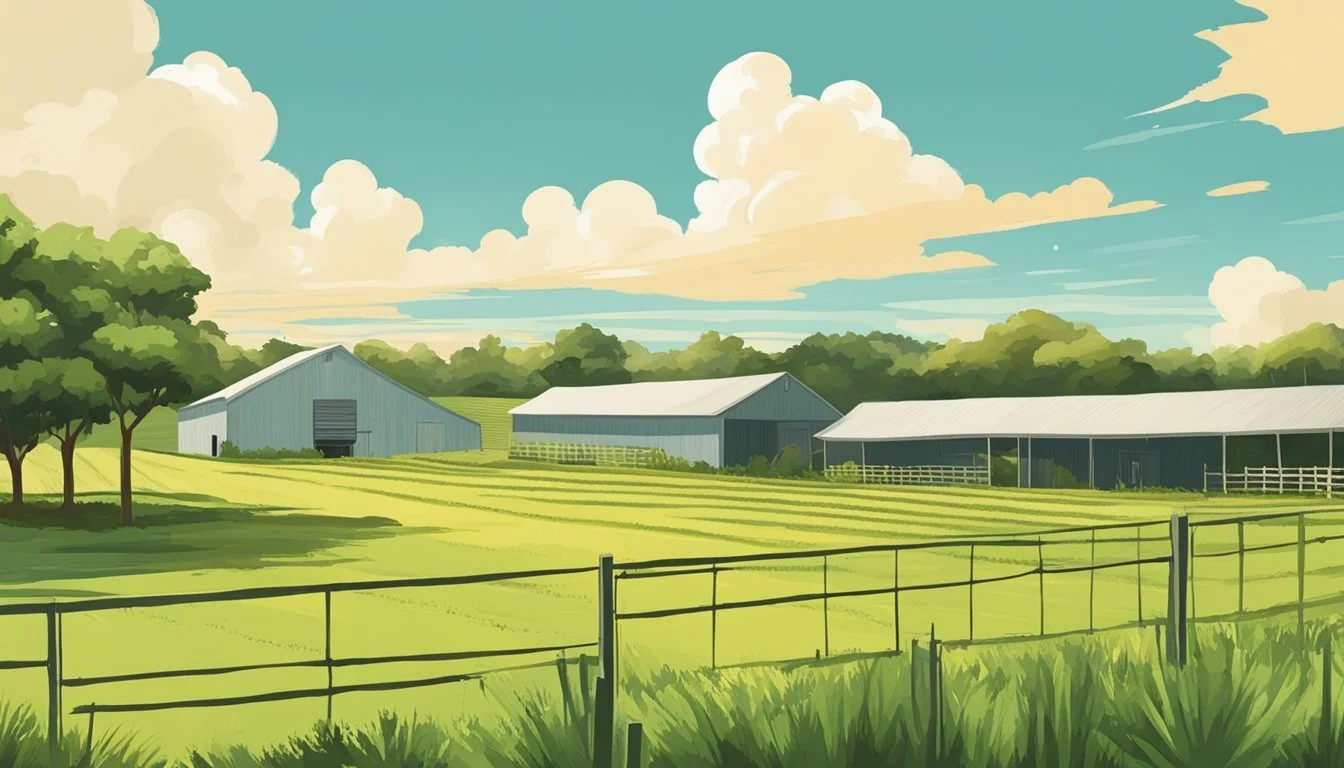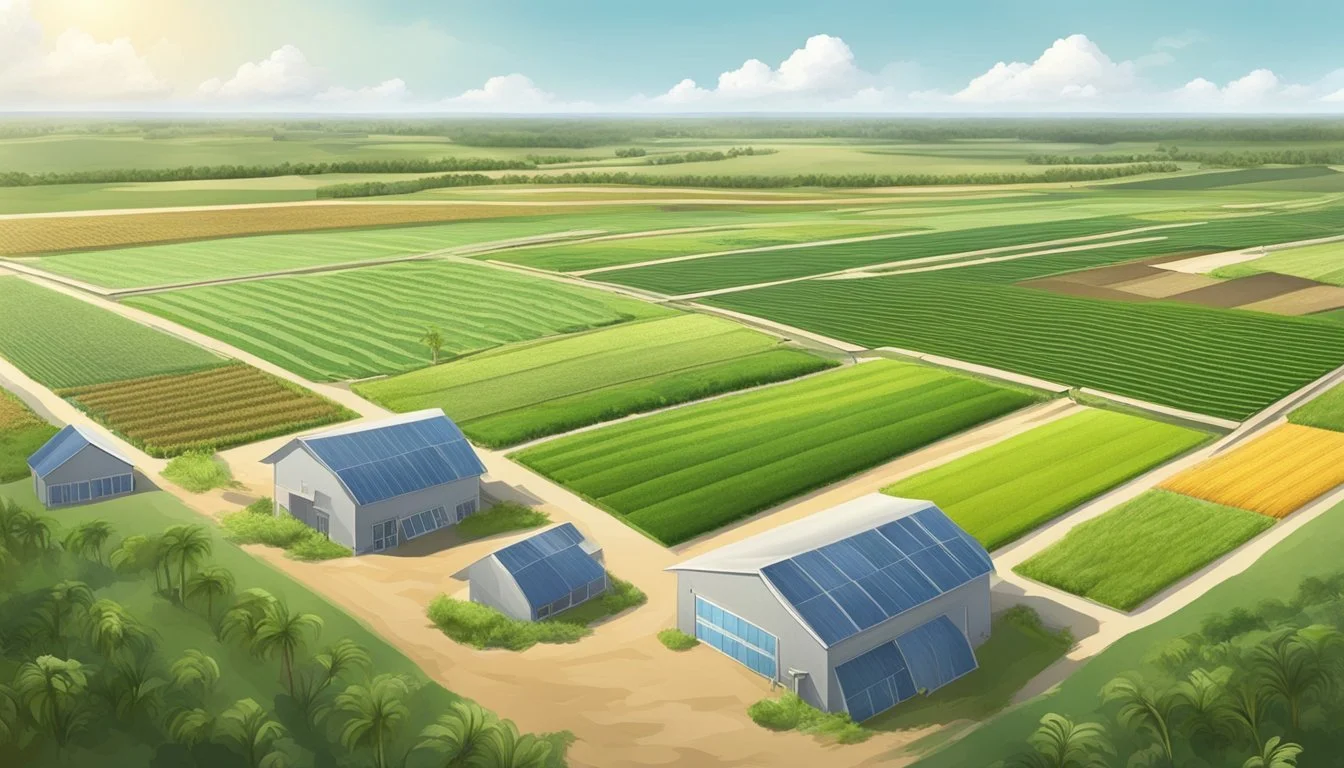Florida Farm Land for Lease
Opportunities for Agricultural Ventures
This Article is Part of Our Guide on Navigating Agricultural Leases Across the US
Leasing farm land in Florida offers a unique opportunity for both landowners and prospective tenants. Florida's climate allows for a diverse range of crops and livestock, making it a versatile location for farming operations. Prospective tenants seeking to lease farm land in the state will find a variety of options, from small acreage plots to expansive tracts suitable for large-scale agriculture. Typically, leases can vary widely in terms, cost, and size depending on the county and the specific needs of the farming venture.
Landowners in Florida have increasingly turned to leasing their properties as a means to maintain agricultural use and benefit from rental income. The state's rich agricultural history and supportive community create an appealing environment for both experienced farmers and newcomers to the industry. With a range of properties available, including some with existing infrastructure like barns and irrigation systems, Florida offers valuable prospects for those looking to lease farm land.
Availability of farm land for lease in Florida encompasses various regions and terrains, from the rolling hills in the northern part of the state to the flat expanses of the south, each presenting its own advantages for different types of farming. Leasing terms and prices (how long does rice last?) vary, reflecting the diversity in size and capability of the lands available. Entities such as LandSearch and FARMFLIP provide platforms to connect landowners with potential lessees, simplifying the process of finding farm land that meets specific requirements in terms of size, location, and resource availability.
Understanding Farm Land Leasing in Florida
In Florida, a farm land lease provides a legal framework for tenants to engage in agriculture on the property of a landowner. This section explores the foundational aspects, the comparison between leasing and owning, and the various types of leases available in Florida's agricultural landscape.
Basics of Farm Land Lease
A farm land lease in Florida is a contractual agreement where the lessee pays the landowner for the use of arable acreage. Recent figures have reported average rental rates ranging from $18.50/acre to $37.00/acre with a mean of $26.10/acre. These leases outline the terms of use, duration, and payment structure, ensuring the lessee can cultivate crops or raise livestock on the leased acres.
Leasing vs. Owning
Leasing farmland in Florida offers flexibility and reduces initial capital expenditure compared to owning property. It enables farmers, especially newcomers to the industry or those with limited resources, to access farmland without the financial burden of a purchase. While ownership provides autonomy and long-term stability, leasing allows for adaptability and often lower yearly costs.
Types of Leases
Three primary types of leases are prevalent in Florida:
Cash Rent Lease: Payment is a fixed amount per acre or a flat fee for the leased land.
Sharecropping Lease: The landowner and the tenant share the costs and revenues from the land's agricultural output.
Flex Lease: A flexible arrangement that may combine aspects of cash rent and sharecropping, often with provisions adjusting rent based on yield or market conditions.
These leases must be carefully crafted to reflect Florida's agricultural standards, aligned with both landowner and farmer interests, and compliant with state regulations.
Florida Farm Land Lease Regulations
Florida's farm land lease regulations are governed by a set of rules that are essential for both landowners and tenants to understand.
State Land Leasing Policies
Florida's agricultural leasing policies dictate how state land can be leased for farming purposes. The Division of State Lands oversees the leasing of state-owned lands for agricultural use. They require that such leases support the conservation of natural resources while also promoting agricultural productivity. Leases can include terms for Animal Husbandry, Crops and Products, and Environmental Conservation, which must be adhered to under the Florida Administrative Code and statutes.
Commercial Farming Regulations
In the context of commercial farming, lessees need to navigate various regulations that relate to their operations. Commercial farming in Florida is subject to both state and federal laws. These may encompass Taxation, Property Rights, and Environmental Regulations. Tax considerations are particularly important, as the land's use can affect its valuation and the tax benefits that may be available to the owner or lessee. Environmental and conservation regulations include laws regarding pesticide use, water management, especially in non-irrigated crop lands, and soil conservation. Compliance with these regulations ensures that commercial farming activities are sustainable and adhere to best practices for land use.
Finding Farm Land for Lease
When searching for farm land for lease in Florida, prospective tenants should focus on the availability of suitable acreage to meet their specific farm operations and understand the minimum acreage requirements often set by landowners.
Researching Available Land
Prospective tenants must exercise diligence in researching available land for lease. Florida offers diversely sized plots across various counties tailored to different agricultural needs. From the rolling fields of Marion County to the expansive tracts in Madison County, options abound. Tenants can find properties ranging from less than an acre to over thirty acres. For instance, a 33-acre plot is available in Madison County, whereas Orange County has smaller parcels. To assess the land's potential accurately, one should consider soil fertility, access to water, and proximity to markets.
Minimum Acreage Requirements
Knowing the minimum acreage requirements is crucial when considering land for lease. Landowners in Florida may set a minimum acreage to lease, ensuring it’s economically feasible for them and beneficial for the lessee's agricultural activities. Acreage requirements can vary widely; some offerings in Pasco County include a 3.5-acre land parcel, indicating a smaller scale of farming or potentially a specialty agricultural business. Lessees should confirm these details early in the negotiation to align their farming plans with the size of the plot they are considering.
Financial Considerations
When assessing Florida farmland leases, tenants and landowners must navigate a range of financial considerations that impact the overall feasibility and profitability of the agricultural operation. Specific lease rates, associated costs and fees, as well as owner finance options, are core components of the financial dialogue.
Lease Rates
In Florida, the cost to lease farmland can vary significantly based on location, land quality, and market demand. Lease rates per acre might range from as low as $24 to upward of $102, with a noted average around $59.50. These values, however, are subject to change based on annual assessments and should be verified with current market data.
Minimum Lease Rate: $24 / acre
Maximum Lease Rate: $102 / acre
Costs and Fees
Beyond the base lease rate, tenants may face additional costs and fees. These can include, but are not limited to, utility costs, property taxes (which may be passed through from the owner), and maintenance expenses. It's critical for parties to outline and agree upon these costs in the lease agreement to avoid disputes.
Maintenance Expenses: Variable, based on agreement
Utility Costs: Dependent on usage
Property Taxes: Possibly part of the rental agreement
Owner Finance Options
Some landowners may offer owner finance options as an alternative to traditional leasing arrangements. This can provide tenants with an opportunity to eventually own the land while making regular payments, akin to a mortgage. Typically, these agreements require a down payment and include interest on the remaining balance.
Down Payment: Required, amount varies
Interest Rate: Dependent on owner and agreement terms
Farm Land Lease Agreements
A farm land lease agreement in Florida is a legally binding contract that dictates the terms under which one party rents agricultural land from another. The agreement outlines details such as lease duration, rent payment terms, and usage rights of the land.
Understanding Lease Terms
Lease Duration: The lease agreement should specify the commencement and termination dates, clearly defining the length of the lease. Leases can range from short-term (annual) to long-term (multiple years), depending on the needs of the parties involved.
Payment Terms: Rent is typically paid in cash, but it may also involve crop share agreements. The specified rent might be a fixed amount or variable, based on factors like market prices or yield.
Payment Type Description Fixed Cash Rent A set amount paid annually regardless of crop prices/yields. Flexible Cash Rent Rent that adjusts based on yields or commodity prices. Crop Share Landowner receives a percentage of the crop or revenue.
Lease Renewal: Details on lease renewal should be included, noting whether the lease has the option to renew and under what conditions this can occur.
Rights and Responsibilities
Landowner's Rights: The landowner retains ownership of the land and may specify certain terms regarding its use. The rights to access the land, conduct inspections, and enforce lease terms are usually reserved by the landowner.
Tenant's Responsibilities: The tenant is often responsible for the day-to-day operations and maintenance of the farm land. Responsibilities may include soil conservation practices, routine repairs, and adhering to government agricultural regulations.
Environmental Compliance: Tenants must ensure their farming practices comply with state and federal environmental laws, including the use of pesticides and water resource management.
Dispute Resolution: A process for resolving disputes should be stipulated, which might include mediation or arbitration prior to any legal action.
Lease Termination: Conditions under which the lease may be terminated should be outlined, which could include breach of contract, sale of the property, or mutual agreement to end the lease.
When creating or entering into a farm land lease agreement in Florida, both parties should be fully aware of their rights and responsibilities, and all terms should be clearly written and understood to ensure a fair and functional leasing arrangement.
Benefits and Drawbacks of Leasing
Leasing farm land in Florida provides unique opportunities and challenges. It is essential for both landowners and tenants to understand these to make informed decisions.
Pros of Leasing Farm Land
Flexibility in Land Use: Tenants gain access to the land without the long-term commitment of purchasing, allowing for more adaptability in their farming operations.
Lower Upfront Costs: Without the need to secure a mortgage for land purchase, the initial capital required is significantly less, making it easier for new or expanding farmers to scale operations.
Risk Mitigation: Landowners can diversify their investment portfolios, and tenants can avoid the risk associated with real estate market fluctuations.
Tax Advantages: Depending on the structure of the lease, both parties may benefit from tax breaks, such as deductions on rent paid for tenants and income generation for landlords without actively farming.
Cons of Leasing Farm Land
Lack of Control: Tenants may have limited say in the long-term use of the land, as they do not hold ownership rights.
Potential for Instability: Short-term leases can lead to uncertainty for tenants who need to plan for crop rotation and land improvements.
Variable Costs: Rent can fluctuate based on the real estate market, potentially increasing expenses unpredictably.
Contractual Disputes: Without a comprehensive lease agreement detailing responsibilities, repair duties, and termination rights, there is potential for legal complications.
Types of Crops and Agriculture
Florida's climate and soil conditions offer diverse opportunities for a range of agricultural endeavors. Specific crops thrive in its unique environment, and specialty farming practices, like rice (how long does rice last?) cultivation, can be optimized for success.
Suitable Crops for Florida
Florida farm land is typically well-suited for a range of crops due to its subtropical climate, ample rainfall, and long growing season. Some of the most common and economically significant crops include:
Citrus Fruits: Florida is renowned for its citrus production, particularly oranges, grapefruits, and tangerines.
Vegetables: The state is a leading producer of tomatoes, cucumbers, bell peppers, and beans.
Sugarcane: Sugarcane thrives in the muck soils of the Everglades Agricultural Area, a primary growing region for the crop.
These crops benefit from Florida's mild winters and hot summers, which allow extended growing seasons and multiple harvests for certain vegetables.
Rice Cultivation in Florida
Although not as widespread as other crops, rice cultivation can be found in Florida due to its water-rich farm land that provides the necessary conditions rice requires. Here's a snapshot of Florida's rice farming:
Type: Florida predominantly grows long-grain rice.
Water Requirements: Rice fields in Florida are often flooded during the growing season to maintain the moist conditions rice needs.
Harvesting: Rice typically has a single harvest season in Florida despite the potential for more due to the state's conducive climate.
The development of rice as a rotational crop with vegetables and sugarcane is being evaluated for its sustainability and soil health benefits.
Land Management and Development
Effective land management and development strategies are vital for maximizing the usefulness and profitability of farm land. Within the context of leasing in Florida, these strategies must respect the naturally diverse conditions of the soil and support sustainable improvements.
Soil and Land Maintenance
Leased farm land requires diligent soil and land maintenance to preserve its value and yield potential. Tenants should:
Regularly test the soil to monitor nutrient levels and pH balance, ensuring optimal conditions for crops.
Implement erosion control measures, such as planting cover crops, to protect the land's topsoil.
Utilize crop rotation and organic matter supplementation to maintain soil health and structure.
Maintaining the land effectively benefits both the lessee and the lessor by preserving the real estate value and productive capacity of the property.
Development and Improvement
Strategic development and improvement of leased farm land can greatly increase its utility and market value. Landlords and tenants may negotiate terms in a lease that allow for, or even encourage, such enhancements. These might include:
Establishing irrigation systems to improve water distribution and crop reliability, often a shared investment between the lessor and lessee in a lease agreement.
Upgrading existing structures or adding new features like greenhouses or storage facilities, guided by owner financing models when outright investment is not possible.
Seeking zoning changes or permits for diversified use, such as agritourism, that can add new revenue streams and increase the appeal of the property.
It is crucial that any planned improvements align with the goals of both the tenant and the property owner, and comply with local land use regulations.
Navigating Foreclosures and Special Cases
When dealing with foreclosed properties or special leasing circumstances, it's crucial to understand the legal framework and status changes that can affect real estate agreements in Florida. These variables can impact both the availability and obligations of agricultural land leases.
Foreclosed Properties
Foreclosed farm properties in Florida present unique challenges and opportunities. According to Florida Statutes, lenders can initiate foreclosure actions and, upon doing so, may seek an order for the borrower to deposit collected rents into the court's registry or a designated location. This process alters the status of the property and can affect leasing agreements. Prospective lessees should:
Review the foreclosure status: Prospective tenants must check whether the farm land is bank-owned or in the process of foreclosure.
Understand the legal implications: Tenants should be aware that leasing a foreclosed property might involve court-regulated payments or restrictions.
Special Leasing Circumstances
Certain special circumstances can affect the leasing of agricultural land in Florida. These can include sovereignty submerged lands and specific state programs. For example, sovereignty submerged land leases require an application to the Florida Department of Environmental Protection, reflecting the additional layers of approval compared to standard leases. Lessees should consider:
Compliance with state programs: Understand the requirements for special state-run leasing programs.
Sovereignty submerged lands: If the property includes submerged lands, a sovereignty submerged lands lease is mandatory, requiring application to and approval by the FDEP.
Steps to Lease Farm Land
Leasing farm land in Florida involves a process that ensures the interests of both the landowner and lessee are met. It’s essential to conduct thorough research, negotiate terms that reflect the current market and individual needs, and finalize the deal with clear documentation.
Initial Research
Prospective lessees should start by identifying available land for lease within preferred counties. The selection of farm land should align with their farming objectives and the status of the land's soil, water availability, and climate suitability. Tools like LandSearch can provide listings with specific details on the acreage and location. Additionally, understanding average rental rates, such as those from NASS reports, provides insight into the financial aspects of leasing.
Negotiating a Lease
The negotiation phase is crucial for outlining the terms of the lease, which may include the length of the lease, rental payments, and farming practices allowed on the land. A lessee must communicate their financial capability and negotiate rent terms; for new farmers, a graduated rent approach can be beneficial. All responsibilities of each party should be defined. It is recommended to involve a professional at this stage, especially since groups like the American Farmland Trust offer guidance to ensure fair leasing agreements.
Closing the Deal
Once both parties agree on the lease terms, it is important to draft a formal agreement. The lease document should cover all specifics discussed during negotiations, including the rental price, lease duration, and renewal options. Closing the deal requires a thorough review of the agreement by both parties, ideally with legal counsel to confirm that it complies with local regulations, before signing. Data from sources like Nationwide stresses the importance of a written lease to avoid disputes in highly competitive markets.









